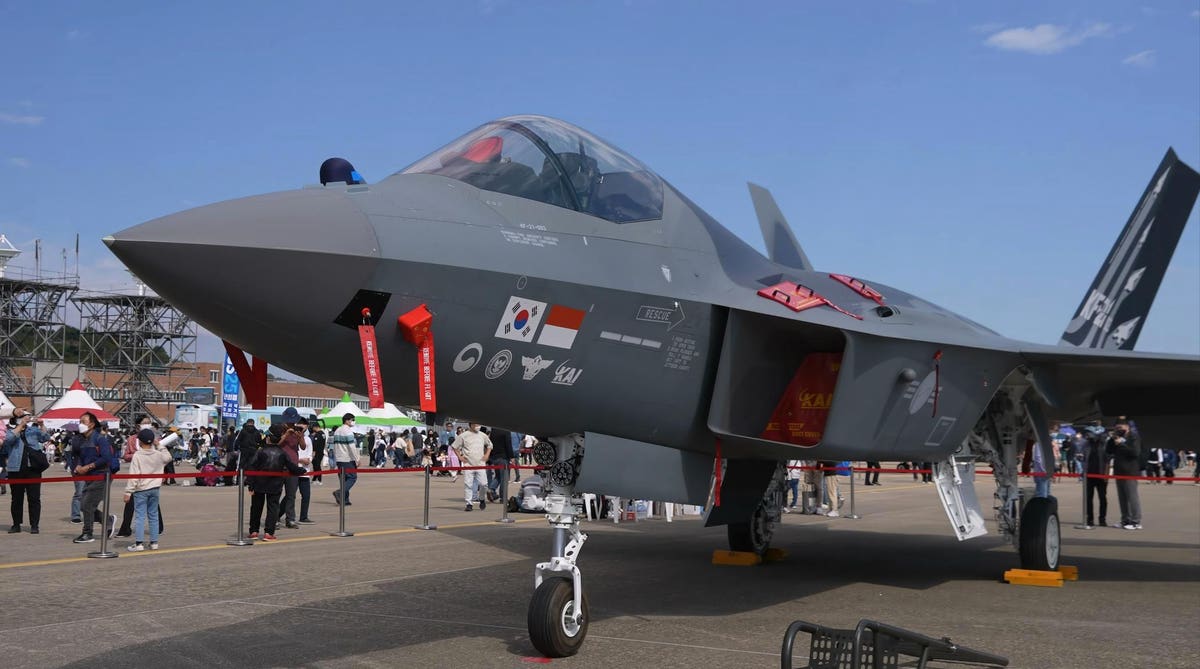The United Arab Emirates has reportedly shown interest in cooperating with South Korea on its KAI KF-21 Boramae fighter jet development program, potentially becoming the third member of that project.
The Financial News, a South Korean daily, claimed in a report on Thursday that South Korea’s Office of National Security received a letter from the UAE’s Tawazun Economic Council outlining Abu Dhabi’s interest in direct cooperation on the KF-21’s development.
Interestingly, the report claimed the letter even suggested Abu Dhabi could replace Indonesia’s investment in the program.
Indonesia has a 20 percent stake but has failed to fulfill its financial commitments. Jakarta, which has had plans to acquire as many as 50 KF-21s, joined the program in 2010 but later began falling behind on payments in 2017, reaching an estimated $557 million in unpaid dues by July 2022. In May, Jakarta tried to ease concerns in Seoul by promising a new payment timetable.
The Financial News report estimates Indonesia’s unpaid contributions currently amount to around 990 billion South Korean won, roughly $745 million.
The UAE’s reported interest hardly comes as a surprise. After all, in January, Abu Dhabi pledged to invest $30 billion in South Korean industries, including defense. In January 2022, the wealthy Arab country signed a $3.5 billion contract for South Korea’s Cheongung II KM-SAM air defense missile system, the largest-ever arms export deal for Seoul at the time.
As these multi-billion-dollar investments in South Korean industries aptly demonstrate, the UAE would hardly have any serious difficulty ponying up what Indonesia owes the Boramae program. Furthermore, Abu Dhabi would undoubtedly be interested in co-producing the fighter since it would help further develop its domestic defense industry through substantive technology transfers, which Seoul has repeatedly proven generous with providing its clients.
The UAE suspended talks over a landmark deal for 50 fifth-generation F-35 Lightning II stealth jets from the United States in late 2021 over disagreements on American preconditions and Emirati cooperation with China.
In 2017, Abu Dhabi signed a preliminary deal to work with Russia on developing an unspecified next-generation fighter. In 2021, Russia displayed a mockup of its planned fifth-generation Su-75 Checkmate at the Dubai Airshow.
However, analysts have repeatedly noted the UAE’s involvement in such programs was more to demonstrate to the U.S. that it had other options for armaments rather than a genuine effort to acquire Russian fighters for its air force, which consists of American and French jets. And, since Russia’s invasion of Ukraine, cooperating with Moscow on such projects is more untenable than ever.
With the F-35 deal seemingly off the table, there aren’t any other viable options currently available to the UAE for buying fifth-generation stealth fighters off-the-shelf. Consequently, joining the KF-21 program makes sense, given that it can secure an acquisition of the advanced aircraft for Abu Dhabi.
The only problem is the first variant of the KF-21, while stealthier than the 4.5-generation aircraft currently on the market, will feature external hardpoints rather than internal weapons bays. So, while close to a fifth-generation fighter, it will still fall short of that technical classification, leading some to unofficially dub it a “4.75-generation” aircraft. Nevertheless, future variants may improve upon this shortcoming.
The timing of this purported Emirati interest in the Boramae is also noteworthy. After all, the UAE’s neighbor, Saudi Arabia, eagerly wants to join the United Kingdom-Italy-Japan Global Combat Air Program (GCAP) developing the sixth-generation Tempest fighter. Riyadh reportedly requested to join in August, mere weeks before the UAE’s reported KF-21 interest.
The GCAP has an ambitious timeline to unveil the Tempest by 2035.
If Saudi Arabia gains admission into the GCAP and the project meets its ambitious deadline, Riyadh could begin acquiring sixth-generation fighters by the second half of the next decade. Such a development would give the Saudi air force a huge technological advantage over its Emirati counterpart.
While the two neighbors are not adversaries, Abu Dhabi would hardly be comfortable with that much of a technological gap in combat airpower between them. And even though the KF-21 won’t close that gap, it will make it less conspicuously wide, especially if the South Korean-led project produces more stealthy Boramaes down the road.
Read the full article here





